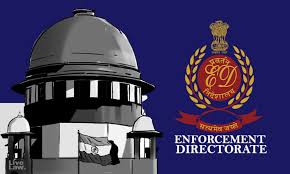NEW DELHI: Often in the news for its raids on alleged money launderers, the Enforcement Directorate (ED) on Thursday faced some tough questions as the Supreme Court cautioned the probe agency that it “cannot act like a crook”, and that it has to work within the four corners of law.
“We are also concerned about the ED’s image. If people are acquitted after five to six years of judicial custody, who will pay for this?” a three-judge Bench led by Justice Surya Kant said while hearing petitions seeking a review of its 2022 verdict that upheld the central agency’s wider powers of arrest under the Prevention of Money Laundering Act (PMLA).
The Bench, which also included Justice Ujjal Bhuyan and Justice N Kotiswar Singh, flagged low conviction rates in money laundering cases probed by the ED.
“You can’t act like a crook, you have to act within the four corners of the law. I observed in one of my judgments that the ED has registered around 5,000 ECIRs in the past five years but the conviction rate is less than 10 per cent….That’s why we have been insisting that you improve your investigation as it deals with the liberty of an individual,” Justice Bhuyan said.
Justice Kant said the answer to all the problems was having dedicated courts akin to TADA and POTA courts and the dedicated PMLA courts could conduct day-to-day proceedings, resulting in expeditious disposal of cases.
“Yes, influential accused will still file numerous applications but these accused and their lawyers will know that since it is day-to-day trial and their application will be decided the very next day. Time has come to hit them hard. We can’t have sympathy for them. I know a magistrate who has to decide 49 applications in a day and pass orders for 10-20 pages in each of them. This cannot go on,” the Bench said.
The court’s comments came after Additional Solicitor General SV Raju, representing the Centre and the ED, questioned the maintainability of the review petitions and attributed the low conviction rate to the delaying tactics of “influential accused”.
“Influential crooks have a lot of wherewithal. They employ a battery of lawyers to file applications after applications at different stages to protract the proceedings and the investigating officer of the case instead of devoting time to investigation keeps on running to court for one application or other,” Raju said.
The ASG also questioned the authenticity of the review petitions, calling them “nothing but appeals” against the 2022 verdict disguised as review.
Referring to one of his judgments, Justice Bhuyan said of the 5,000 cases registered by the ED in the past five years, there were less than 10 per cent convictions and this factual statement was substantiated by the minister in Parliament.
On crypto-currencies, Justice Kant said the government ought to seriously think of regulating it for people operating different apps and crypto stock exchanges.
Earlier, Solicitor General Tushar Mehta told a Bench led by CJI BR Gavai that the ED had recovered around Rs 23,000 crore laundered money and distributed it to the victims of financial crimes. The CJI’s Bench was hearing petitions seeking a review of its May 2 judgment ordering liquidation of Bhushan Power & Steel Limited while setting aside a resolution plan of JSW Steel Limited for the ailing company.


